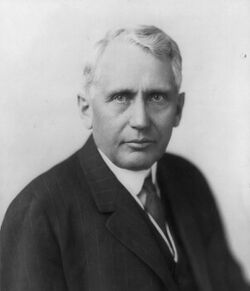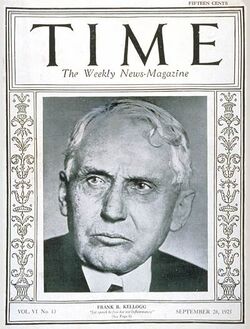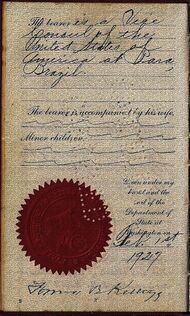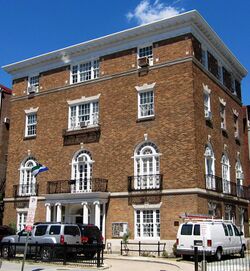Biography:Frank B. Kellogg
Frank B. Kellogg | |
|---|---|
 Kellogg in 1912 | |
| Associate Judge of the Permanent Court of International Justice | |
| In office September 25, 1930[1] – September 9, 1935[2] | |
| Preceded by | Charles E. Hughes[3] |
| 45th United States Secretary of State | |
| In office March 5, 1925 – March 28, 1929 | |
| President | Calvin Coolidge Herbert Hoover |
| Preceded by | Charles Evans Hughes |
| Succeeded by | Henry L. Stimson |
| United States Ambassador to the United Kingdom | |
| In office January 14, 1924 – February 10, 1925 | |
| President | Calvin Coolidge |
| Preceded by | George Harvey |
| Succeeded by | Alanson B. Houghton |
| United States Senator from Minnesota | |
| In office March 4, 1917 – March 3, 1923 | |
| Preceded by | Moses E. Clapp |
| Succeeded by | Henrik Shipstead |
| County Attorney of Olmsted County | |
| In office January 1, 1882[4] – January 1, 1887[5] | |
| Preceded by | Halfton A. Eckholdt[6][7] |
| Succeeded by | Burt W. Eaton[8] |
| City Attorney of Rochester | |
| In office 1878–1881 | |
| Personal details | |
| Born | Frank Billings Kellogg Potsdam, New York |
| Died | December 21, 1937 (aged 80) St. Paul, Minnesota |
| Political party | Republican |
| Spouse(s) | Clara Cook |
| Awards | Nobel Peace Prize 1929 Legion of Honour |
| Signature | |
Frank Billings Kellogg (December 22, 1856 – December 21, 1937) was an American lawyer, politician, and statesman who served in the U.S. Senate and as U.S. Secretary of State.[9] He co-authored the Kellogg–Briand Pact, for which he was awarded the Nobel Peace Prize in 1929.[10]
Early life and career
Kellogg was born in Potsdam, New York, on December 22, 1856, the son of Abigail (Billings) and Asa Farnsworth Kellogg.[11] His family moved to Minnesota in 1865.[12]
Kellogg read law and began practicing law in Rochester, Minnesota, in 1877. He served as city attorney of Rochester 1878–1881 and county attorney for Olmsted County, Minnesota, from 1882 to 1887. He moved to St. Paul, Minnesota, in 1886.[12]
In 1905, Kellogg joined the federal government when Theodore Roosevelt asked Kellogg to prosecute a federal antitrust case.[13] In 1906, Kellogg was appointed special counsel to the Interstate Commerce Commission for its investigation of E. H. Harriman. In 1908, he was appointed to lead the federal prosecution against Union Pacific Railroad, under the Sherman Antitrust Act.[14][15][16] His most important case was Standard Oil Co. of New Jersey v. United States, 221 U.S. 1 (1911). Following this successful prosecution, he was elected president of the American Bar Association (1912–1913). He was a member of the World War Foreign Debts Commission.[17]
In 1907, Kellogg was honored as a Compatriot of the Minnesota Society of the Sons of the American Revolution.[18]
United States Senate
In 1916, Kellogg was elected as a Republican to the United States Senate from Minnesota and served from March 4, 1917, to March 3, 1923, in the 65th, 66th, and 67th Congresses. During the ratification battle for the Treaty of Versailles, he was one of the few Republicans who supported ratification. He lost his re-election bid in 1922 and, in 1923, he was a delegate to the Fifth International Conference of American States at Santiago, Chile.[12]
Ambassador to Great Britain
In 1924, he was appointed by President Calvin Coolidge as Ambassador Extraordinary and Plenipotentiary to Great Britain,[19] serving from January 14, 1924, to February 10, 1925. He succeeded George Brinton McClellan Harvey who served under Warren G. Harding and was succeeded by Alanson B. Houghton so that Kellogg could assume the role of Secretary of State.[12]
Secretary of State
From 1925 to 1929, he served as the United States Secretary of State in the Cabinet of President Coolidge.[20] In 1928, he was awarded the Freedom of the City in Dublin, Ireland and in 1929 the government of France made him a member of the Legion of Honour.[12]
As Secretary of State, he was responsible for improving U.S.–Mexican relations and helping to resolve the long-standing Tacna–Arica controversy between Peru and Chile. His most significant accomplishment, however, was the Kellogg–Briand Pact, signed in 1928. Proposed by its other namesake, French foreign minister Aristide Briand, the treaty intended to provide for "the renunciation of war as an instrument of national policy." Kellogg was awarded the 1929 Nobel Peace Prize in recognition.[12][21][22] (Briand had already won the Nobel Peace Prize in 1926).[23]
He was associate judge of the Permanent Court of International Justice from 1930 to 1935.[24][25][26][27]
He was elected to the American Philosophical Society in 1931.[28]
Kellogg was self-conscious about his lack of academic credentials; he attended a one-room country school and dropped out at age 14. He never attended high school, college or law school. His only advanced training came from clerking in a private lawyer's office. Kellogg grew up in a poor farm in Minnesota, and lacked a commanding presence or the sophistication to deal with the aristocrats who dominated European diplomacy. As Secretary of State, his main focus was Latin America, where he dealt with brutal but unsophisticated strongmen. His staff provided the ideas, and they appreciated that he was always open, candid, and easy to communicate with. He helped end the battle between the Mexican government and the Catholic Church, but failed to resolve the dispute over ownership of the oil reserves. In the Far East, he followed the advice of Nelson Trusler Johnson, the new chief of the Division of Far Eastern Affairs. They favored China and protected it from threats from Japan. They successfully negotiated tariff reform with China, thereby giving enhanced status to the Kuomintang and helping get rid of the unequal treaties.[29] As for Europe he was primarily interested with expanding the limitations on naval armaments that been established by the Washington Treaty; he made little progress. Kellogg gained international fame, and the Nobel Peace Prize, with the Kellogg–Briand Pact. It was endorsed by nearly every nation and made starting a war a punishable criminal action. It formed the legal basis for the trial and execution of German and Japanese war leaders after 1945.[30]
Personal life
In 1886, Kellogg was married to Clara May Cook (1861–1942), the daughter of George Clinton Cook (1828–1901) and Elizabeth (née Burns) Cook (1838–1908).[31]
In 1880, he became a member of the Masonic Lodge Rochester No. 21, where he received the degrees of freemasonry on April 1, April 19, and May 3.[32]
He died from pneumonia, following a stroke, on the eve of his 81st birthday in St. Paul.[9] He was buried at the Chapel of St. Joseph of Arimathea in Washington National Cathedral, Washington, D.C.[12]
Legacy
In 1937, he endowed the Kellogg Foundation for Education in International Relations at Carleton College, where he was a trustee.[33] His house in St. Paul, the Frank B. Kellogg House was listed as a National Historic Landmark in 1976.[34]
The following were named in his honor:
- Kellogg Boulevard in downtown Saint Paul.[35]
- Kellogg Middle School in Shoreline, Washington, and Rochester, Minnesota,[citation needed] as was Frank B. Kellogg High School (closed 1986) in Little Canada, Minnesota, which had been a part of Roseville School District 623.
- A Liberty ship, the SS Frank B. Kellogg
Papers
Frank B. Kellogg's papers are available for research use at the Minnesota Historical Society. They include correspondence and miscellaneous papers, State Department duplicates, news clippings scrapbooks, awards, floor plans, honorary degrees, maps, memorials and memoranda.[36]
See also
- List of people on the cover of Time magazine: 1920s
References
- ↑ Treaty Information Bulletin No. 1-117 (October 31, 1929–June 30, 1939, Volumes 1-20)
- ↑ Digest of International Law, Volume 12 (1971)
- ↑ Permanent Court of International Justice, Volumes 1-4 (United States Congress - House Committee on Foreign Affairs, 1932)
- ↑ Executive documents of the State of Minnesota for 1881
- ↑ Executive Documents of the State of Minnesota (1887, Volume 1)
- ↑ Executive documents of the State of Minnesota for 1879-1880, Volume 1
- ↑ Cite error: Invalid
<ref>tag; no text was provided for refs namedbook - ↑ Report of the Minnesota Attorney General (1888-1890)
- ↑ 9.0 9.1 "Frank B. Kellogg Dies At Age Of 81 [sic. Winner of Nobel Peace Prize for Pact Outlawing War, Ex-Secretary of State"]. The New York Times. December 22, 1937. https://www.nytimes.com/1937/12/22/archives/frank-b-kellogg-dies-at-age-of-81-winner-of-nobel-peace-prize-for.html. "Frank B. Kellogg, former World Court judge and Secretary of State, died at 7:28 P. M., Guy Chase, his law partner, announced tonight."
- ↑ "The Nobel Peace Prize 1929". Nobelprize.org. https://www.nobelprize.org/nobel_prizes/peace/laureates/1929/.
- ↑ Sobel, Robert (1990). Biographical Directory of the United States Executive Branch, 1774-1989. Greenwood Press. ISBN 9780313265938. https://books.google.com/books?id=_h97tuO2xJQC&q=abigail+billings+Asa+Farnsworth+Kellogg&pg=PA208.
- ↑ 12.0 12.1 12.2 12.3 12.4 12.5 12.6 "KELLOGG, Frank Billings - Biographical Information". Biographical Directory of the United States Congress. http://bioguide.congress.gov/scripts/biodisplay.pl?index=K000065.
- ↑ Miss nobel-id as parameter , accessed 29 April 2020
- ↑ "Taft Declines Comment.; F.B. Kellogg, in Conference with Candidate, Also Silent Now.". The New York Times. July 23, 1908. https://www.nytimes.com/1908/07/23/archives/taft-declines-comment-fb-kellogg-in-conference-with-candidate-also.html.
- ↑ "Article 2 -- No Title". The New York Times. November 21, 1909. https://www.nytimes.com/1909/11/21/archives/article-2-no-title.html.
- ↑ Neubeck, Deborah Kahn. "Collection Finding Aids, Frank B. Kellogg chronology". http://www2.mnhs.org/library/findaids/00982.xml.
- ↑ Official congressional directory, 70th congress - 1st session (December 1927)
- ↑ American Revolution, Sons of the (1907). National Year Book. National Society of the Sons of the American Revolution.
- ↑ "2,000 Nominations Made by Coolidge; List Is Headed by Frank B. Kellogg for Ambassador to Britain.". The New York Times. December 11, 1923. https://www.nytimes.com/1923/12/11/archives/2000-nominations-made-by-coolidge-list-is-headed-by-frank-b-kellogg.html.
- ↑ "Sacasa Protests Kellogg's Course; Said to Have Threatened in Message to Rouse Latin America Against US. Will Keep Up the Fight: He Promptly Denies Story That He Is Giving Up in Face of Our Opposition.". The New York Times. January 15, 1927. https://www.nytimes.com/1927/01/15/archives/sacasa-protests-kelloggs-course-said-to-have-threatened-in-message.html.
- ↑ "Kellogg to Go to Oslo.; But Nobel Peace Prize Winner Is Uncertain When He Can Pay Visit.". The New York Times. November 29, 1930. https://www.nytimes.com/1930/11/29/archives/kellogg-to-go-to-oslo-but-nobel-peace-prize-winner-is-uncertain.html.
- ↑ "Kellogg Gets Honorary Degree at Oxford; Outstanding Candidate for Nobel Peace Prize". The New York Times. November 27, 1929. https://www.nytimes.com/1929/11/27/archives/kellogg-gets-honorary-degree-at-oxford-outstanding-candidate-for.html.
- ↑ "The Nobel Peace Prize 1926". Nobel Foundation. https://www.nobelprize.org/nobel_prizes/peace/laureates/1926/index.html.
- ↑ Photo, Manley O. Hudson, Bemis Professor of International Law, Harvard Law School times Wide World (October 12, 1930). "Who's Who of the Judges Elected to World Court; Frank B. Kellogg". The New York Times. https://www.nytimes.com/1930/10/12/archives/whos-who-of-the-judges-elected-to-world-court-frank-b-kellogg.html.
- ↑ Kellogg, Frank B. (December 24, 1933). "The Road to Peace". The New York Times. https://www.nytimes.com/1933/12/24/archives/the-road-to-peace.html.
- ↑ "Cabinet Members Explain New Deal; Cummings and Roper Urge at Rollins College Education as Aid to Government. Both Receive Degrees: College at Founders' Day Celebration Honors Frank B. Kellogg for World Peace Efforts.". The New York Times. February 27, 1934. https://www.nytimes.com/1934/02/27/archives/cabinet-members-explain-new-deal-cummings-and-roper-urge-at-rollins.html.
- ↑ Installation ceremony of Frank B. Kellogg at Permanent Court of International Justice, The Hague (1930), at YouTube.
- ↑ "APS Member History". https://search.amphilsoc.org/memhist/search?creator=Frank+B.+Kellogg&title=&subject=&subdiv=&mem=&year=&year-max=&dead=&keyword=&smode=advanced.
- ↑ Russell D. Buhite, "Nelson Johnson and American Policy Toward China, 1925-1928". Pacific Historical Review (1966): 451-465 online.
- ↑ Edward Mihalkanin, ed. (2004). American Statesmen: Secretaries of State from John Jay to Colin Powell. pp. 293-98.
- ↑ "Mrs. F. B. Kellogg, Diplomat's Widow; Was Hostess for Her Husband Co-Author of Peace Pact and Ex-Secretary of State Dies at St. Paul Home Aided Mrs. Coolidge at White House Fetes: Couple Marked 50th Anniversary in 1936". The New York Times. October 3, 1942. https://www.nytimes.com/1942/10/03/archives/mrs-f-b-kell066-diplomats-widow-was-hostess-for-her-husband.html.
- ↑ Denslow, William R. (1957). "10,000 Famous Freemasons". Macoy Publishing & Masonic Supply Co.. http://www.phoenixmasonry.org/10,000_famous_freemasons/Volume_3_K_to_P.htm.
- ↑ "Carleton College Gets $500,000 Gift; Frank B. Kellogg Establishes Unit for Study of International Relations". The New York Times. June 8, 1937. https://www.nytimes.com/1937/06/08/archives/carleton-college-gets-500000-gift-frank-b-kellogg-establishes-unit.html.
- ↑ "Frank B. Kellogg House". National Historic Landmark summary listing. National Park Service. http://tps.cr.nps.gov/nhl/detail.cfm?ResourceId=1447&ResourceType=Building.
- ↑ Millett, Larry (2007). AIA Guide to the Twin Cities: The Essential Source on the Architecture of Minneapolis and St. Paul. Minnesota Historical Society Press. pp. 142. ISBN 978-0-87351-540-5.
- ↑ Frank B. Kellogg Papers
Further reading
- Bryn-Jones, David (1937). Frank B. Kellogg: A Biography. New York: G. P. Putnam's Sons. (Reprinted in 2007: ISBN:978-1-4325-8982-0) online
- Carroll, Francis M. "Secretary of State Frank B. Kellogg Comes to Ireland, 1928". in America and the Making of an Independent Ireland (New York University Press, 2021) pp. 184–198.
- Cleaver, Charles G. "Frank B. Kellogg: Attitudes and Assumptions Influencing His Foreign Policy Decisions" (PhD dissertation, University of Minnesota; ProQuest Dissertations Publishing, 1956. 590377).
- Ellis, Lewis Ethan (1961). Frank B. Kellogg and American Foreign Relations, 1925-1929. New Brunswick, N.J.: Rutgers University Press. online
- Ellis, Lewis Ethan (1968). Republican Foreign Policy, 1921–1933 online
- Ellis, L. Ethan (1961). "Frank B. Kellogg" in An Uncertain Tradition: American Secretaries of State in the 20th Century. ed. Norman A. Graebner. pp. 149–67.
- Ferrell, Robert H. Frank B. Kellogg & Henry L. Stimson: The American Secretaries of State and Their Diplomacy. Cooper Square Publishers, 1963. online
- Rhodes, Benjamin D. (2001). United States Foreign Policy in the Interwar Period, 1918–1941: The Golden Age of American Diplomatic and Military Complacency. pp. 57–72.
- Weber, Eric. "Kellogg, Frank Billings (1856–1937)". MNopedia. Minnesota Historical Society.
Primary sources
- Kellogg, Frank (1925). China's Outstanding Problems. OCLC 40941492.
- Kellogg, Frank B. "American Policy and Chinese Affairs". American Bar Association Journal 11.9 (1925): 576-579. online
- Kellogg, Frank B. "Some Foreign Policies of the United States". Foreign Affairs, vol. 4, no. 2, 1926, pp. i-xvii. online
- Kellogg, Frank B. "The World Court". Minnesota Law Review 14 (1929): 711+ online.
External links
- United States Congress. "Frank B. Kellogg (id: K000065)". Biographical Directory of the United States Congress. http://bioguide.congress.gov/scripts/biodisplay.pl?index=K000065.
- *Template:20th Century Press Archives – FID missing or invalid*
- Miss nobel-id as parameter
- Frank B. Kellogg at Find a Grave
| Party political offices | ||
|---|---|---|
| First | Republican nominee for U.S. Senator from Minnesota (Class 1) 1916, 1922 |
Succeeded by Arthur E. Nelson |
| Unrecognised parameter | ||
| Preceded by Moses E. Clapp |
U.S. Senator (Class 1) from Minnesota 1917–1923 Served alongside: Knute Nelson |
Succeeded by Henrik Shipstead |
| Diplomatic posts | ||
| Preceded by George Harvey |
United States Ambassador to the United Kingdom 1924–1925 |
Succeeded by Alanson B. Houghton |
| Political offices | ||
| Preceded by Charles Evans Hughes |
United States Secretary of State 1925–1929 |
Succeeded by Henry L. Stimson |
{{Navbox | name = Nobel Peace Prize laureates | state = autocollapse | bodyclass = hlist | title = Laureates of the Nobel Peace Prize | nowrapitems = yes
| group1 = 1901–1925 | list1 =
- 1901: [[Biography:Henry DunHenry Dunant / Frédéric Passy
- 1902: Élie Ducommun / Charles Gobat
- 1903: Randal Cremer
- 1904: Institut de Droit International
- 1905: Bertha von Suttner
- 1906: Theodore Roosevelt
- 1907: Ernesto Moneta / Louis Renault
- 1908: Klas Arnoldson / Fredrik Bajer
- 1909: A. M. F. Beernaert / Paul Estournelles de Constant
- 1910: International Peace Bureau
- 1911: Tobias Asser / Alfred Fried
- 1912: Elihu Root
- 1913: Henri La Fontaine
- 1914
- 1915
- 1916
- 1917: International Committee of the Red Cross
- 1918
- 1919: Woodrow Wilson
- 1920: Léon Bourgeois
- 1921: Hjalmar Branting / Christian Lange
- 1922: Fridtjof Nansen
- 1923
- 1924
- 1925: Austen Chamberlain / Charles Dawes
| group2 = 1926–1950 | list2 =
- 1926: Aristide Briand / Gustav Stresemann
- 1927: Ferdinand Buisson / Ludwig Quidde
- 1928
- 1929: Frank B. Kellogg
- 1930: Nathan Söderblom
- 1931: Jane Addams / Nicholas Butler
- 1932
- 1933: Norman Angell
- 1934: Arthur Henderson
- 1935: Carl von Ossietzky
- 1936: Carlos Saavedra Lamas
- 1937: Robert Cecil
- 1938: Nansen International Office for Refugees
- 1939
- 1940
- 1941
- 1942
- 1943
- 1944: International Committee of the Red Cross
- 1945: Cordell Hull
- 1946: Emily Balch / John Mott
- 1947: Friends Service Council / American Friends Service Committee
- 1948
- 1949: John Boyd Orr
- 1950: Ralph Bunche
| group3 = 1951–1975 | list3 =
- 1951: Léon Jouhaux
- 1952: Albert Schweitzer
- 1953: George Marshall
- 1954: United Nations High Commissioner for Refugees
- 1955
- 1956
- 1957: Lester B. Pearson
- 1958: Georges Pire
- 1959: Philip Noel-Baker
- 1960: Albert Lutuli
- 1961: Dag Hammarskjöld
- 1962: Linus Pauling
- 1963: International Committee of the Red Cross / League of Red Cross Societies
- 1964: Martin Luther King Jr.
- 1965: UNICEF
- 1966
- 1967
- 1968: René Cassin
- 1969: International Labour Organization
- 1970: Norman Borlaug
- 1971: Willy Brandt
- 1972
- 1973: Lê Đức Thọ (declined award) / Henry Kissinger
- 1974: Seán MacBride / Eisaku Satō
- 1975: Andrei Sakharov
| group4 = 1976–2000 | list4 =
- 1976: Betty Williams / Mairead Corrigan
- 1977: Amnesty International
- 1978: [[Biography:Anwar SaAnwar Sadat{{\}}Menachem Begin
- 1979: Mother Teresa
- 1980: Adolfo Pérez Esquivel
- 1981: United Nations High Commissioner for Refugees
- 1982: Alva Myrdal / Alfonso García Robles
- 1983: Lech Wałęsa
- 1984: Desmond Tutu
- 1985: International Physicians for the Prevention of Nuclear War
- 1986: Elie Wiesel
- 1987: Óscar Arias
- 1988: UN Peacekeeping Forces
- 1989: Tenzin Gyatso (14th Dalai Lama)
- 1990: Mikhail Gorbachev
- 1991: Aung San Suu Kyi
- 1992: Rigoberta Menchú
- 1993: Nelson Mandela / F. W. de Klerk
- 1994: Shimon Peres / Yitzhak Rabin / Yasser Arafat
- 1995: Pugwash Conferences / Joseph Rotblat
- 1996: Carlos Belo / José Ramos-Horta
- 1997: International Campaign to Ban Landmines / Jody Williams
- 1998: John Hume / David Trimble
- 1999: Médecins Sans Frontières
- 2000: Kim Dae-jung
| group5 = 2001–present | list5 =
- 2001: United Nations / Kofi Annan
- 2002: Jimmy Carter
- 2003: Shirin Ebadi
- 2004: Wangari Maathai
- 2005: International Atomic Energy Agency / Mohamed ElBaradei
- 2006: Grameen Bank / Muhammad Yunus
- 2007: Al Gore / Intergovernmental Panel on Climate Change
- 2008: Martti Ahtisaari
- 2009: Barack Obama
- 2010: Liu Xiaobo
- 2011: Ellen Johnson Sirleaf / Leymah Gbowee / Tawakkol Karman
- 2012: European Union
- 2013: Organisation for the Prohibition of Chemical Weapons
- 2014: Kailash Satyarthi / Malala Yousafzai
- 2015: Tunisian National Dialogue Quartet
- 2016: Juan Manuel Santos
- 2017: International Campaign to Abolish Nuclear Weapons
- 2018: Denis Mukwege / Nadia Murad
- 2019: Abiy Ahmed
}}
Minnesota's delegation(s) to the 65th–67th United States Congresses (ordered by seniority)
Template:USCongRep/MN/65 Template:USCongRep/MN/66 Template:USCongRep/MN/67 |
|---|
 |







